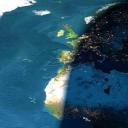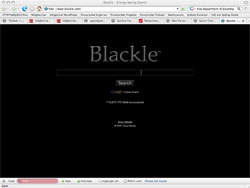I’ve been looking at this photograph for hours, scattered over the last few days.
It was apparently taken from the space shuttle Columbia. No it wasn’t, scroll down for the comments. I shouldn’t need to point out that the big lumpy thing in the foreground is called Africa, and further back there’s the thing they call Europe.
It fascinates me because it — literally! — puts things in perspective. Some of the world’s greatest cities are invisible, at least in daylight. The Low Countries are just starting to blaze in artificial light. But the brightest lights are the flares of oil wells in the deserts of Algeria and Libya, and off the coast of Nigeria.
Hey, aren’t the people there starving? That can’t be right, if they’ve got all that oil, surely?
Thanks to Memex 1.1 for the pointer.


